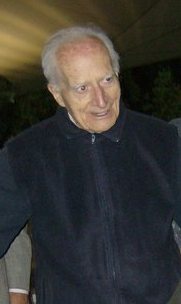José Aldunate facts for kids
Quick facts for kids
José Aldunate
|
|
|---|---|

José Aldunate in 2010
|
|
| Born |
José Aldunate Lyon
June 5, 1917 |
| Died | September 28, 2019 (aged 102) |
| Occupation | Jesuit priest, teacher, human rights defender |
| Years active | 1952–2019 |
| professor of ethics, worker priest and defender of human rights | |
| In office 1952–2019 |
|
José Aldunate Lyon (born June 5, 1917 – died September 28, 2019) was a Jesuit priest and a teacher from Chile. He was also a worker and a strong supporter of human rights during a time when Chile was ruled by a military government. In 2016, he received the National Prize for Human Rights because of his important work.
Contents
About His Life
His Early Years
José Aldunate was born in Santiago, Chile. His parents were Carlos Aldunate Errázuriz and Adriana Lyon Lynch. He was the second of four children in his family.
His family was wealthy, and he learned English from governesses (teachers who lived with the family) who came from England. This meant he learned English before he even learned Spanish! From 1928 to 1930, his family lived in England. José and his older brother Carlos went to a Jesuit school called Stonyhurst College in Lancashire.
In 1933, José Aldunate decided he wanted to become a Jesuit. Jesuits are a group of Catholic priests and brothers who are known for their focus on education and helping others.
Becoming a Jesuit and His Work
In March 1933, José Aldunate began his training to become a Jesuit in Chile. In 1935, he made his first promises as a member of the Christian Schools. He spent some years in Argentina and then taught at San Luis school in Antofagasta, Chile.
Later, he went back to Argentina to study Theology, which is the study of religious faith. On December 23, 1946, he became a priest in San Miguel, Buenos Aires. After that, he traveled to Europe to study Religious Studies and Ethics. He studied in Rome, at the Pontifical Gregorian University, and at the Catholic University of Leuven. He earned a special degree in economics and ethics.
In 1950, he returned to Chile. His first job was to help Father Alberto Hurtado with the Chilean Trade Union Action (ASICH). This group helped workers. José Aldunate learned two important lessons from Father Hurtado: how important justice is and how to help people who are poor.
Besides his work with ASICH, José Aldunate also became a professor of ethics at the Pontifical Catholic University of Chile in Santiago. He also held other important positions within the Jesuits. He was a Master of Novices (someone who trains new Jesuits), the director of a magazine called Message, and the director of a research center. Eventually, he became the Provincial of the Jesuits in Chile, which means he was in charge of all the Jesuits in the country.
The 1960s brought many changes around the world and in the Church, especially with the Second Vatican Council. These changes greatly influenced José Aldunate's path.
Life as a Worker Priest
Even though he was in a high position as the head of the Jesuits in Chile, Father José Aldunate decided to take a different path. He chose to become a "worker priest."
In 1973, he joined a program to become a worker priest in Calama. A worker priest is someone who works a regular job, like in a factory or mine, to truly understand the lives of working people. This helps them connect their religious work with real-world experiences. Father Aldunate spent time working in a mine called Chuquicamata.
He decided to be a worker for six months of the year and continue teaching ethics at the Catholic University for the other six months. He kept this routine for about five years. He believed that teaching ethics was not just about theories, but also about practicing what you preach by experiencing life as a worker.
See also
 In Spanish: José Aldunate para niños
In Spanish: José Aldunate para niños
- Religious groups in the Catholic Church
- Pontifical Gregorian University

